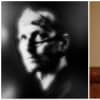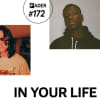Selim Bulut is a music writer who lives in Manchester. He has the most meticulously organized iTunes folder in the land. He’ll be writing about some of the excellent music coming out of the UK every other week.
Blludd Relations are the sort of group that make you radiate with pure glee. They make you want to whip out descriptors like “perfect pop,” a cringeworthy phrase at the best of times, but an apt one if you can disregard the cliché and consider what it could mean. It’s music that’s infatuated with the possibilities of pop, enchanted by pop’s international variations, wide-eyed with the wonders of sound and songwriting, and maybe too interested in the particulars and peculiarities of the world around to bother with the pop industry.
Blludd Relations are Nathan Jenkins and Jesse Hackett. Jenkins is perhaps better known as Bullion, one of the finest British musicians around today (he was featured on Dollars To Pounds way back when), having released amazing EPs, mini-albums and stacks of remixes through labels like Young Turks, One Handed Music and his own Deek Recordings, where he also acts as an in-house producer for the label’s roster. Hackett, meanwhile, is a restless multi-instrumentalist who seems unable to function properly unless he’s in about seven different bands at any one time—besides Blludd Relations and his solo work, he’s a member of Owiny Sigoma Band, and before that he was a part of Elmore Judd, the keyboardist for Gorillaz’ touring band and a frequent player with cultural exchange project Africa Express. He also co-hosts the Pipe Down! show on NTS Radio.
Jenkins and Hackett bonded over a mutual appreciation for odd and outsider pop, and throughout our conversation they reference all sorts of esoterica plucked from the annals of pop’s history, from Ralph Records (the imprint established by original provocateurs The Residents) to Holger Czukay’s solo albums to the surprisingly influential video game Music 2000. As Blludd Relations, they continue this eccentric tradition—less a particular sound, more a particular outlook—and mix it with a refreshingly bright and undeniably British sense of humour. They released a self-titled debut album last month, made up of 10 off-kilter picks—stream the gorgeous “Anything But The Fingers” from that album, and read my interview with the duo, below.
Stream: Bludd Relations, "Anything But the Fingers"
How did you first meet? HACKETT: We met through a mutual friend called Selom, who’s been working at Plastic People in London for a long time and was aware of both me and Nathan’s music. My former band, Elmore Judd, had come to a natural standstill I guess, and I was looking to branch out. I’d heard some of Nathan’s music, and Selom suggested that it might be cool to hook up and try a collaboration. Or just hang out. We got together and listened to records and started jamming. Within our first or second meet up we were pressing record and pulling out keyboards and playing around with drum machines and having fun.
Was it always the intention to release the music you worked on together? JENKINS: I hadn’t really worked with anyone properly before, so for me at first it was curiosity about collaborating, but quite quickly it felt like we were moving towards more than just a couple of tracks and we talked about doing an LP. Early on it was mainly me recording Jesse playing keys, and also bağlama, which is like a little Greek guitar, quite a bit.
And the album came out on Deek Recordings, which is your own label, and you’re the in-house producer… JENKINS: Yeah, it was initially set up just to release my five-track EP last May, and then there were a few other people floating around that I started to do other stuff with. I think there’s just a whole group of us who’ve got quite a likeminded approach to music and we’re trying to just do something that’s got a sense of humour and isn’t too “serious, ”but at the same time, not half-arsed. It seemed like a nice channel to release all the various collaborations.
That’s something I’ve picked up on your solo music over the years, that sense of humour. I hate to say it like this, but it’s very “British.” JENKINS: I was just about to say, the British thing is very strong. British but with a very “worldly” approach. Labels like Ralph Records and Cherry Red are influential in that way. Jesse's mentioned recently how there seems to be a lot of “earnestness” in modern music. The Deek thing is trying to be an antithesis to that, trying to bring back a more traditional older record label ethic, with a British sense of humour. It’s not a question of making “it,” it’s a question of making music and trying to do something with feeling and passion rather than always having to appeal to everyone and thinking about where it’s all gonna end up.
The British-but-worldly thing makes sense, because Jesse, you did the Africa Express stuff, right? HACKETT: That’s correct. I have been involved in the Africa Express project since its trip to Mali in 2006, and I’m really fortunate and privileged to have been on two other trips with those guys. We travelled to Kinshasa to the Congo and also to Lagos, and did various different concerts in and around Europe over the space of, like, six years now. So yeah, that’s been a terrific experience. I’ve done quite a bit of traveling—I just actually got back from Morocco two days ago, where I was at the Gnaoua Festival collaborating with Gnaoua musicians, traditional Moroccan style music. I like to do as much of that sort of stuff as possible. JENKINS: Funnily enough, we were just talking about Fred Frith. He released a lot of stuff on Ralph Records and collaborated with all kinds of world musicians. He’s quite a classic example of someone that me and Jesse connected on, taste-wise. He brings all kinds of round the world elements to his stuff, but also with little production trickery and kind of poppy arrangements. HACKETT: I think you can hear the freedom within those records, those guys really voyaging with their music in the improvisational sense, like a jazz musician or any other improviser. It’s framed with a really nice production ethic and lots of attention to sound, lots of dubbing out of sounds, really nice recordings of drums, and it’s also quite poppy and quite fun. All of those elements were something we were subconsciously aware of.
What had you been doing, outside of music, before making the Blludd Relations record? HACKETT: I was in quite a depressive state, actually. I’d just come off a year playing keyboards with Gorillaz. I’d done a world tour with them and I had a wonderful time, but once that came to a close it was that weird sense of, like, What do I do now? I’d been playing huge stadiums every night with a bunch of people and that had slipped away. I went to Thailand for a month, where I had quite a strange, lonely, peculiar time, and just came back feeling quite lost in myself and not really knowing what to do. I don’t think I was doing a great deal before hooking up with Nathan. JENKINS: For some reason I can’t think of anything else around the time of making the record other than what we would do in between recording. There’s this little Spanish deli just a few doors down from where I live and we recorded quite a lot of stuff here at mine, and we’d just go and buy really dry sandwiches and drink Spanish beer and that was kind of… that’s all I can remember [laughs]. HACKETT: Nathan’s place is in West London and it’s a nice atmosphere just out on the street here, with Portobello Road and everything, so I guess that is the backdrop of the lot of the creation. You can see the Westway out the window. I’ve definitely stared at the Westway, and the cars floating by endlessly, during the creation of the record.
When you were playing with Gorillaz, was that when they were drafted in to headline Glastonbury? HACKETT: Yeah, I played that.
So how does this project compare to that? Going from one big thing like that to a tiny little thing. HACKETT: It’s equally as amazing an experience as playing with Gorillaz, which was a totally different experience. I guess it took a lot of courage to go out and play there in front of such big audiences, but that was an amazing thing to be part of. I feel lucky on both accounts, basically.
Okay, last question. Where did the name Blludd Relations come from? HACKETT: The name comes from Judd—as in Elmore Judd—and from Bullion. We just fused the two together, like a blood transfusion. JENKINS: The blood relations. HACKETT: Blludd Donations. JENKINS: Blludd Donations, that’s quite good! HACKETT: We just thought the word “Blludd” was very strong. We thought it could be a nice running theme for future releases. So it’s Bullion and Judd—Blludd.


